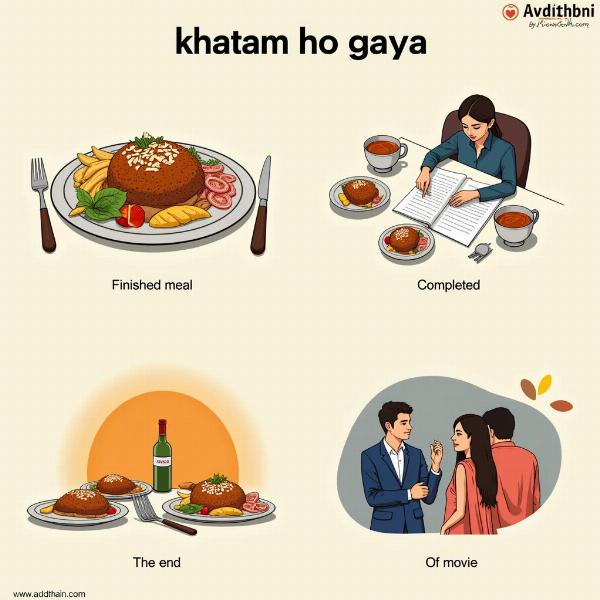“It’s over now” carries a sense of finality, marking the end of something. Whether a relationship, a job, or a difficult period, understanding its nuances in Hindi can deepen your grasp of the cultural context and allow you to express yourself with precision. This article will delve into various Hindi translations of “it’s over now,” exploring their subtle differences and providing practical examples to help you navigate these expressions confidently.
Different Ways to Say “It’s Over Now” in Hindi
The Hindi translation of “it’s over now” isn’t a simple one-to-one correspondence. The most appropriate translation depends on the specific context. Here are some common options:
- Khatam ho gaya (खत्म हो गया): This is perhaps the most direct and widely used translation. It literally means “finished” or “completed.” It’s suitable for general situations where something has come to an end. For example, you could say “Kaam khatam ho gaya” (काम खत्म हो गया) meaning “The work is over now.”
- Ab bas ho gaya (अब बस हो गया): This phrase carries a stronger connotation of finality, often implying exhaustion or frustration. It’s commonly used when someone has reached their limit and wants something to stop. “Ab bas ho gaya, main aur nahi kar sakta” (अब बस हो गया, मैं और नहीं कर सकता) translates to “It’s over now, I can’t do this anymore.”
- Samaapt ho gaya (समाप्त हो गया): This is a more formal and literary way of saying “it’s over now.” It’s often used in official contexts or when discussing serious matters.
- Chuka hai (चुका है): This word implies completion and is often used in the past tense. “Yeh baat chuki hai” (यह बात चुकी है) means “This matter is over now.”
 Khatam Ho Gaya Meaning in Different Contexts
Khatam Ho Gaya Meaning in Different Contexts
Choosing the Right Hindi Expression
Selecting the most accurate translation of “it’s over now” hinges heavily on the situation. Consider the following examples:
- Ending a Relationship: “Ab bas ho gaya” might convey the finality of a breakup, especially if it was a difficult one.
- Completing a Task: “Khatam ho gaya” is suitable for announcing the completion of a project or chore.
- Formal Announcement: “Samaapt ho gaya” would be appropriate for a formal declaration of an event’s conclusion.
Cultural Nuances and Context
Like many phrases, “it’s over now” carries cultural baggage. In India, where relationships and social hierarchies play a significant role, the way you express finality can be crucial. Using a harsh tone with “ab bas ho gaya” could be considered rude in some situations. Understanding these nuances can help you communicate effectively and avoid misunderstandings.
How to Say “It’s Over Now” in Different Scenarios
Let’s examine some specific scenarios and how you might use these Hindi phrases:
- After a long argument: “Chalo, yeh baat ab chuki hai.” (चलो, यह बात अब चुकी है) – Let’s move on, this matter is over now.
- Finishing a meal: “Khana khatam ho gaya.” (खाना खत्म हो गया) – The meal is over.
- Announcing the end of a meeting: “Meeting samaapt ho gaya hai.” (मीटिंग समाप्त हो गया है) – The meeting is adjourned.
Conclusion
“It’s over now,” a seemingly simple phrase, holds various shades of meaning. By understanding the different Hindi translations and their cultural contexts, you can express yourself with greater accuracy and sensitivity. Choosing the appropriate phrase – be it “khatam ho gaya,” “ab bas ho gaya,” “samaapt ho gaya,” or “chuka hai” – depends heavily on the situation and the relationship with the person you are speaking to. Remember to consider the tone and context to ensure your message is conveyed effectively and respectfully.
FAQ
-
What is the most common way to say “it’s over now” in Hindi? Khatam ho gaya is generally the most common and versatile translation.
-
When should I use “ab bas ho gaya”? Use this phrase when expressing finality with a sense of exhaustion or frustration.
-
Is “samaapt ho gaya” formal or informal? It’s a more formal and literary expression.
-
What does “chuka hai” imply? It signifies completion, often in the past tense.
-
Why is understanding cultural context important when using these phrases? The cultural context can influence how your message is perceived, especially in sensitive situations.
Meaning-Hindi.in specializes in providing accurate and culturally sensitive Hindi translations for a variety of needs, from business documents to legal and technical materials. Our expertise also extends to website localization and academic translations. Whether you need a quick turnaround or specialized industry knowledge, Meaning-Hindi.in is here to assist. Contact us at [email protected] or +91 11-4502-7584 for all your Hindi translation requirements.